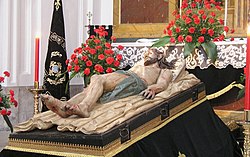Great Saturday
| Holy Saturday | |
|---|---|

Statue of Jesus lying in the tomb by Gregorio Fernández. (Monastery of San Joaquín y Santa Ana, Valladolid)
|
|
| Official name | Holy Saturday |
| Also called | Easter Eve, Black Saturday |
| Observed by | Christians |
| Type | Religious |
| Significance | Marks the day Jesus' body lay in the tomb and the Harrowing of Hell |
| Date | Day before Easter |
| 2016 date |
26 March (Western) 30 April (Eastern) |
| 2017 date |
15 April (Western) 15 April (Eastern) |
| 2018 date |
31 March (Western) 7 April (Eastern) |
| 2019 date |
20 April (Western) 27 April (Eastern) |
| Frequency | annual |
| Related to | Easter |
26 March (Western)
15 April (Western)
31 March (Western)
20 April (Western)
Holy Saturday (Latin: Sabbatum Sanctum), the Saturday of Holy Week, also known as Holy and Great Saturday, the Great Sabbath, Black Saturday, Joyous Saturday, or Easter Even, and called "Joyous Saturday" or "the Saturday of Light" among Coptic Christians, is the day after Good Friday. It is the day before Easter and the last day of Holy Week in which Christians prepare for Easter. It commemorates the day that Jesus' body lay in the tomb and the Harrowing of Hell.
In Eastern Orthodoxy this day, known as Holy and Great Saturday, is also called The Great Sabbath since it is on this day that Christ "rested" physically in the tomb. But it is also believed that it was on this day he performed in spirit the Harrowing of Hades and raised up to Paradise those who had been held captive there. In the Coptic, Ethiopian and Eritrean Orthodox Churches, this day is known as Joyous Saturday.
In Western traditions, the day is usually called Holy Saturday, although in the Anglican Communion, the Book of Common Prayer refers to the day as Easter Even. Although the term Easter Saturday is usually applied to the Saturday in Easter week, in English-speaking countries it is sometimes applied to Holy Saturday, including in legislation in the Australian states of New South Wales and Queensland, and by Australian government agencies. In the Catholic tradition, the Blessed Virgin Mary as Our Lady of Sorrows is on this day assigned the title Our Lady of Solitude, referring to her solace and grief at the death of her son Jesus. However, nowhere in Catholic liturgical documents is this day referred to as the feast of Our Lady of Solitude.
...
Wikipedia
